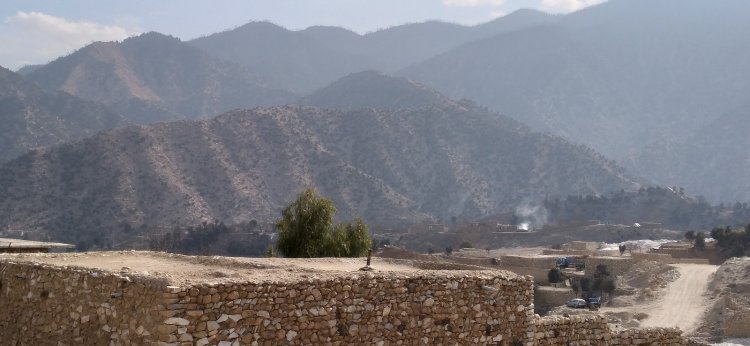Poverty and Climate Change: Deforestation on the Rise in Many Parts of the Country

In recent years, climate change, persistent drought, natural disasters, poverty, population growth, environmental pollution, the absence of programs for the protection of natural resources, and economic difficulties have all contributed to the endangerment of forests in various provinces across the country.
These natural forests have given each region its own unique beauty, but in some parts of the country, many residents, unaware of their value, have resorted to cutting down trees to use as firewood or a source of income throughout the seasons.
In many districts of Kunar, residents have been compelled to cut down forests to meet their fuel and living expenses.
Abdul Manan, a resident of Narai district in Kunar province, says that people have turned to cutting down forests due to economic hardship and the need to support their families, as they have no other way to earn a living.
He adds that the wood from the trees cut down by locals is sold at a very low price in the market and some of it is smuggled into Pakistan.
According to him, thousands of hectares of forested mountainous areas exist in Kunar, but a portion has already been destroyed, with timber trafficked to other provinces and even beyond the country.
Abdul Manan said: “Like many others in Narai, I go to the mountains and cut down various trees like pine and walnut. We sell the wood in the market—this is out of necessity. There’s no other way to earn money, and unfortunately, many forests have already been lost because of this.”
At the same time, concerns have been raised on social media that the forests of Kunar are being destroyed with the involvement of Pakistan, and that timber is being illegally smuggled into that country.
In addition to Kunar, residents of Nuristan have also started cutting down forests arbitrarily, which has led to the destruction of many forested areas in the province.
Jamil, a resident of Kamdesh district in Nuristan, says that the deforestation by locals has recently intensified and is often carried out collectively at night by villagers.
He says that locals are well aware that cutting down forests not only harms the environment but also threatens the lives of animals and birds.
Jamil adds: “In various parts of Nuristan, forests are being mercilessly cut down at night by locals, and the wood is then sold illegally to traders. People have no other work, and they see these forests as their only source of income.”
Similarly, Hamidullah, a resident of Hisarak district in Nangarhar, says that trees are being cut down not only due to poverty but also by some local Taliban commanders, which has further endangered the forests.
According to him, the wood cut down by locals and commanders is transported by vehicles to cities and sold at 20 to 30 Afghanis per man (a unit of weight).
Hamidullah added: “Forests are under serious threat because everyone is trying to cut down trees and sell the wood in the market. The deforestation is happening openly, even by the Taliban themselves. While the market price for a man of timber is 70 Afghanis, the smuggled wood is sold for just 20 to 30 Afghanis.”
In contrast, in many parts of Zazi Maidan district in Khost, forests had been cut down for various reasons, but now some residents say they have taken steps to protect the remaining forests through local tribal agreements.
Naqeeb Khan, a resident of Zazi Maidan, says that there hasn’t been enough public awareness about forest restoration and protection, which is why people continue to cut down trees.
He urges relevant authorities to provide technical and financial support, which would strengthen their efforts to protect the forests.
He said: “The little forest that remains here is thanks to people’s awareness. Recently, we have been protecting these forests through tribal agreements. We are sacrificing day and night to protect our national wealth and hope to have a thriving forest in the future.”
Another resident of the district, Mir Mohammad, said that forests are a national treasure and that efforts to protect them should come from the grassroots level.
He emphasized that responsible authorities must implement specific programs for forest preservation, restoration, and agricultural development.
He also highlighted the importance of public awareness alongside community involvement in forest protection, saying that if locals agree through tribal pacts to ban illegal logging and smuggling, this national asset can still be saved.
Mir Mohammad added: “Forests are our national wealth and should be protected. Many people rely on forests for their household income, but destroying them is a betrayal of the country. Everyone must do their part to protect the forests and avoid cutting trees unless absolutely necessary.”
Meanwhile, the United Nations Food and Agriculture Organization (FAO) has stated that climate change has wiped out 50% of forests in Afghanistan. The organization also noted that it has helped restore thousands of hectares of forests across various regions of the country.
The FAO stressed that forests play a key role in economic development and agricultural growth, and they can help prevent floods, reduce harmful gases, and protect soil erosion.
Environmental experts also emphasize that forest preservation, tree planting, cultivation of medicinal plants, expansion of agricultural lands, and protection of natural resources are essential for water supply and the preservation of ecosystems.
